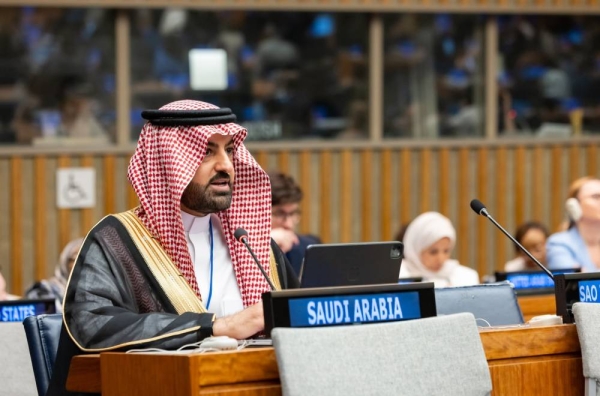Our Terms & Conditions | Our Privacy Policy
Saudi Arabia outlines progress on gender equality and partnerships at UN forum
NEW YORK — Removing barriers to women’s participation in economic and social life has been a central focus of Saudi Arabia’s reforms under Vision 2030, the Ministry of Human Resources and Social Development (HRSD) emphasized during the 2025 UN High-Level Political Forum (HLPF) in New York.
Participating as part of the Kingdom’s wider delegation led by the Ministry of Economy and Planning, HRSD Deputy Minister for International Affairs Dr. Tariq Alhamad delivered remarks during two key sessions—one on the review of Sustainable Development Goal (SDG) 5 on Gender Equality, and another on institutional collaboration and sustainability.
Dr. Tariq highlighted that Vision 2030 is enabling inclusive growth by aligning long-term national reforms with the UN Sustainable Development Goals. “Vision 2030 is more than a set of goals. It brings government, civil society and the private sector into shared delivery,” he said.
“We’ve focused not only on policy, but on the support systems women need to participate fully—whether that’s jobs, childcare or reliable transport. There’s more to do, but we’ve made real progress, and we’re determined to build on it.”
Saudi Arabia’s female workforce participation reached 36.3% in the first quarter of 2025, up from 19.7% in 2018.
National initiatives such as Qurrah, which has supported over 40,000 women with childcare services, and Wusool, which has helped more than 300,000 women with transport to and from work, have been instrumental.
Maternity leave has been extended to 12 weeks at full pay, and nearly 1.3 million women are now engaged in freelance work.
At the HLPF side event, Dr. Tariq discussed HRSD’s broader institutional approach to inclusive partnerships.
He emphasized that durable reform depends on transparent systems, cross-sector collaboration, and strong institutional capacity.
HRSD has implemented new legal frameworks for volunteering, donations, and nonprofit work. Through the National Center for Non-Profit Sector, and digital platforms like the National Volunteer Portal and Ehsan, the Ministry is expanding civil society’s role in service delivery and innovation.
These efforts support multiple SDGs, including Gender Equality (SDG 5), Decent Work (SDG 8), Reduced Inequality (SDG 10), Strong Institutions (SDG 16), and Partnerships for the Goals (SDG 17).
Dr. Tariq also noted Saudi Arabia’s collaboration with international organizations such as the International Labour Organization and the World Bank, ensuring national reforms meet global standards while being rooted in local realities.
“Vision 2030 and the 2030 Agenda were launched the same year. They’re not the same, but they speak to many of the same goals,” he said.
“For us, the SDGs are not abstract. They’re reflected in the way we build institutions, form partnerships, and serve our communities.” — SG
Images are for reference only.Images and contents gathered automatic from google or 3rd party sources.All rights on the images and contents are with their legal original owners.



Comments are closed.